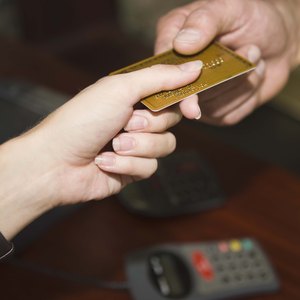
Your credit report shows a history of your use of credit; it tells the story of the money you owe and have owed in the past and whether you paid it back regularly and on time. When you use your debit card, you're not borrowing money. Instead, you're simply taking your own money out of your bank account. As a result, using your debit card won't affect your credit, but if you overdraw on your bank account, the negative balance is a delinquent amount that you owe to your bank and your bank could report it to the credit bureaus (also called agencies).
What Is a Credit Report?
Your credit report is a compilation of your credit history. There are three major credit reporting agencies: Equifax, Experian and TransUnion. These independent agencies assign you a credit score based upon the history in your report.
The higher the score, the better your credit. When you borrow money, the lender reports the obligation to the credit reporting agencies and periodically updates it with your pay history. Lenders use credit reports when making lending decisions. A review of your credit report will show a potential lender how risky or not risky it is to loan you money.
What's on a Credit Report?
Your credit report lists all your mortgages, loans, credit cards and other debts going back many years. It may also list leases such as car leases or apartment rentals. The report discloses whether you were late with a payment or whether you've missed a payment.
Credit reports also indicate whether you ever filed for bankruptcy or had a property foreclosed. It may also list money judgments against you. If an account goes into collections, the collection agency will report that to the credit bureaus, causing your credit score to drop.
Using Debit Isn't Using Credit
A debit card is a plastic card, much like a credit card, that you can use to make purchases. They are different, however.
When you buy something with a credit card, you're essentially borrowing the money from the credit card company and will have to pay it back. When you use a debit card, you're not borrowing money. Instead, you're paying with the money that's in your bank account.
Even if you use your debit card as a credit card, as many stores allow you to do when the cashier rings you up, you're still not borrowing money. Using your debit card as a credit card simply delays the money coming out of your bank account. If you use your PIN to make the purchase, the money comes out immediately.
Overdrawn Accounts May Impact Score
If your debit card is declined, it means you don't have enough money in your bank account to cover the purchase. No money is taken out of your account, and no money is borrowed.
In some cases, though, your card might not be declined even though you don't have enough money to cover the purchase. The bank will let the transaction go through and pay the whole amount, but your bank account balance will be negative. This is called an overdraft, and when your bank account is negative, it means you owe the bank money. The bank will also charge you overdraft fees for every transaction that brings your account below zero and every transaction after that until you deposit enough money to make the balance positive and cover all pending transactions.
If you overdraw your bank account to a large degree, the bank will close your account, and if you don't pay back the negative balance and overdraft fees, the bank may turn the account over to collections. At that point, the collection agency will report the delinquency to the credit bureaus.
References
- Federal Trade Commission: Using Debit Cards
- USA.gov: Credit Reports and Scores
- Consumer Financial Protection Bureau. "What Is an Overdraft?" Accessed March 10, 2020.
- Bank of America. "Understanding Bank of America Interest Checking," Page 1. Accessed March 10, 2020.
- BBVA. "What You Need to Know About Overdrafts and Overdraft Fees." Accessed March 10, 2020.
- Experian. "Does an Overdraft Affect Your Credit Score?" Accessed March 10, 2020.
- Consumer Financial Protection Bureau. "My Bank or Credit Union Closed My Checking Account. Will This Hurt My Credit?" Accessed March 10, 2020.
- Consumer Financial Protection Bureau. "My Debt Is Several Years Old. Can Debt Collectors Still Collect?" Accessed March 10, 2020.
- National Credit Union Administration. "Overdraft and Non-Sufficient Funds (NSF) Fees." Accessed March 10, 2020.
- Capital One. "Credit Card Agreement for Consumer Cards in Capital One," Page 1. Accessed March 10, 2020.
- Discover. "What Happens When My Credit Card Goes Delinquent?" Accessed March 10, 2020.
- Consumer Financial Protection Bureau. "Data Point: Frequent Overdrafters," Page 5. Accessed March 10, 2020.
- Federal Deposit Insurance Corporation. "Credit Card Activities Manual - Behavior Scoring." Accessed March 10, 2020.
- Consumer Financial Protection Bureau. "How Do I Get a Copy of the Report Banks Use to Decide Whether to Let Me Open a Checking Account?" Accessed March 10, 2020.
Writer Bio
Rebecca K. McDowell is an attorney focused on debts and finance. She has a B.A. in English and a J.D. She has written finance and tax articles for Zacks and eHow.

